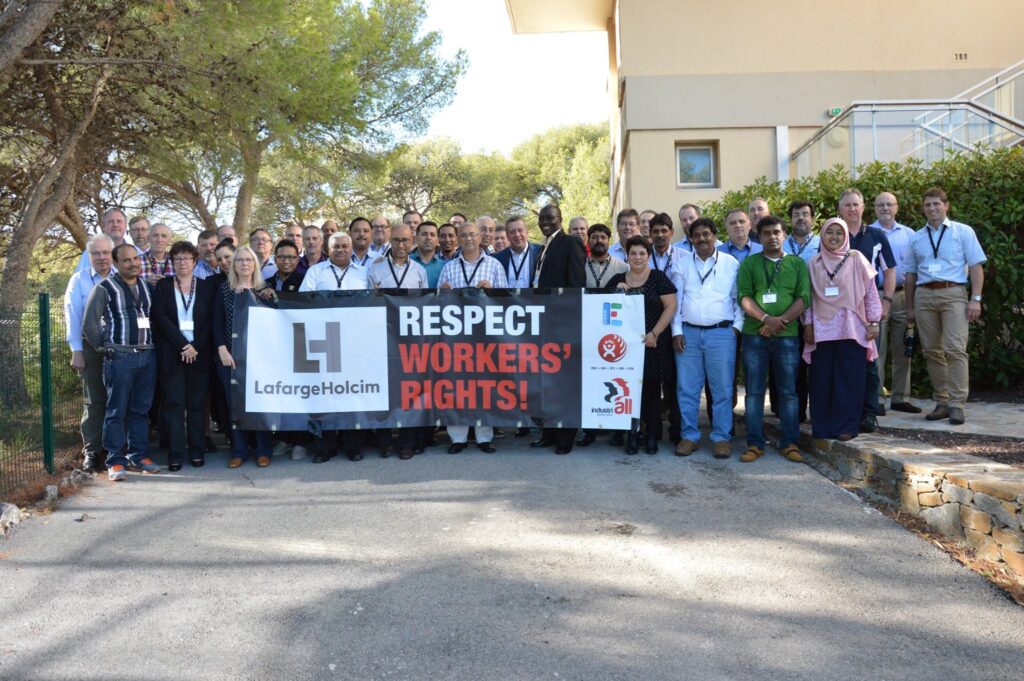21 October, 2016About 60 delegates from different countries all over the world with presence of the leading cement and construction materials producer, LafargeHolcim came to Hyeres, France for their third world union conference from 17 to 19 October 2016.
The main aim of the conference was to elaborate the pathway for future work and social dialogue in LafargeHolcim. Based on results of the conference the delegates adopted unanimously the “Hyeres Declaration”.
“We appreciate the willingness of the corporate management to enter into this dialogue, but we need to see more serious commitments, timely solutions and finally a written agreement,” states the declaration.
The delegates exchanged updates on workers’ situation at the group facilities in Europe, Asia, Africa, Middle East, Latin and North America. Delegates from all regions raised concerns about LafargeHolcim’s excessive use of precarious work, resulting in impoverishment, rights violations and fatalities of workers.
The social dialogue in LafargeHolcim is not yet where it should be, and some delegates could not attend the conference. Their respective local management had strongly resisted. The issue was raised with global management of the company who promised to resolve this matter.
In Canada in the beginning of the year, a labour conflict resulted in a strike of workers and an illegal use of strike-breakers by local management. With assistance of IndustriALL Global Union the case was denounced to global management of the company, and the conflict was finally solved in May 2016.
Unfortunately this was not the last conflict, at the conference USW representatives from Canada, Les Metallos, reported of yet another lockout over at LafargeHolcim facility this time at Texada Limestone Mine, British Columbia. The locked-out workers received a strong solidarity message from the conference participants who promised to address the issue with the global management through IndustriALL Global Union and Building and Woodworkers’ International and demand to put an end to the conflict and to restart the negotiations.
The participants noticed some progress at the European level including on the European Works Council agreement, negotiations of which are panned to finalize before the end of the year. They also expressed disappointment that LafargeHolcim has not yet entered into negotiations over a global framework agreement.
The resolution of the almost 25-yearlong conflict and IndustriALL affiliate PCSS’ victory in India has been warmly welcomed. The Indian colleagues reported on further developments of the situation at their plant. But still, part of the conflict in another region of India remains unsolved: the local management refuses to negotiate and solve the issue of people who lost their land to LafargeHolcim’s predecessors.
Claire Boulic Ramaget, deputy head of labour relations and social policies at LafargeHolcim attended the conference and presented company’s future vision and sustainability strategy “The 2030 plan”, and answered questions of the participants. Feliciano Gonzalez, head of labour relations and social policies at LafargeHolcim group, could not attend the session, but he dialled in had a chance to speak to and answer questions of the delegates. Mr Gonzalez confirmed the company's intention to continue negotiations over social dialogue structures with global unions IndustriALL and BWI, including health and safety matters as integral part of the social dialogue.
Alister Scott, head of health department at LafargeHolcim group presented the new LafargeHolcim health plan in which the group sets health hazards prevention as their priority.
With reference to the presented plan Brian Kohler, IndustriALL director for health, safety and sustainability, commented,
“We compliment LafargeHolcim for their efforts in developing their new occupational health and safety plan. The intention of the company to set prevention of health hazards as a priority gives us encouragement. However we regret that management so far failed to involve workers’ representatives in any stage of the elaboration of the proposed plan. Unfortunately the safety side of the plan still focuses on workers’ behaviours rather than safety systems. During the first half of this year 50 people were killed while on job for the company. This means, that the situation with respect to fatalities in LafargeHolcim turned from bad to worse. We strongly believe that all of these deaths are preventable and would be avoided if the group starts involving workers in the design and implementation of all occupational health and safety policies, programmes and procedures at the global, national and plant levels.”
Commenting on the conference results Matthias Hartwich, director for mechanical engineering and materials said,
“I’m proud to be part of this global network. We made a great progress, we made fundamental decisions and we will enter into the social dialogue with the company as soon as they are willing to and I’m glad we had all this wonderful people around and we will make progress over the next months and I’m pretty convinced of that. But we still have a long way to go.”
“We need to organize and we need to get those countries on board, where social dialogue is not as strong as in the countries present in this meeting. We promise to do so and we promise that we will come to a real social dialogue with LafargeHolcim that involves workers and their unions on local, national, regional and global level.”
At the end of the meeting, the world union committee resolved to come together again next year and continue with their work.
